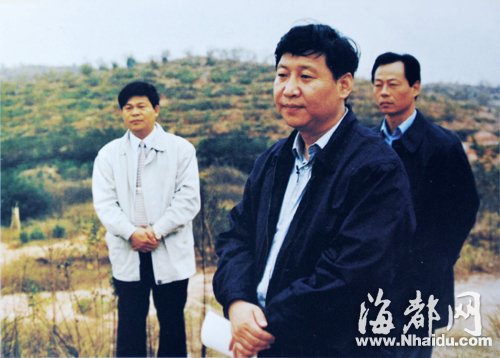Xi Jinping's 17 years in Fujian
- By Pang Li
 0 Comment(s)
0 Comment(s) Print
Print E-mail The Economic Observer, November 21, 2012
E-mail The Economic Observer, November 21, 2012
|
|
|
Xi Jinping in Fujian. [Nhaidu.com] |
Xi Jinping, the new general secretary of the Communist Party of China (CPC), took various Party and government posts in China's southeastern coastal province of Fujian from 1985 to 2002, years which proved to be decisive in his political career.
"In the 17-and-a-half years I worked in Fujian, I personally experienced the upheavals that Fujian underwent in the wave of reform and opening-up. I have established deep revolutionary rapport with local cadres and masses," Xi said while meeting a Fujian delegation in Beijing during the annual parliamentary sessions in March 2010. He described those years as "wonderful" in an interview with Xiamen Daily in 2006.
In 1985 at the age of 32, Xi was appointed as the deputy major of Xiamen, a harbor and manufacturing hub of Fujian Province. At that time, China was in its initial stage of reform and opening-up. Xiamen was designated as one of four special economic zones, playing a pioneering role in the country's economic transition.
"I went to Xiamen with great enthusiasm to be a part of the reform and opening-up practices," Xi told Xiamen Daily in the 2006 interview.
For him, the three-year tenure was an intensive learning process because it was the first time that he had been involved in urban management and development.
"I felt that the three-year tenure was a comprehensive, intensive and arduous learning process. First, I had never taken such a position before. Secondly, nobody had work experience in a special economic zone. Therefore, my double inexperience was made up by my tenure in the special economic zone. My life was enriched in Xiamen," he recalled.
In 1988, Xi was appointed as the Party chief of the prefectural committee in Ningde, a poor area of Fujian. "When I took the position, China was facing inflation and economic overheating, and the Party Central Committee and the State Council decided to take actions to rein in the situation. Radical economic measures were not suitable under such circumstances," he told China Profiles magazine in 2000. Therefore, he asked local officials to take a progressive approach and focus on "solid and basic work".
As a result, Xi managed to put the local economic development on a healthy track. In his two-year tenure, the area successfully pulled more than 96 percent of destitute people out of abject poverty.
Xi was also highly praised by the locals for his tough stance against corruption. At that time, the local Party officials were notorious for land grabbing and power abuse. He openly attacked such transgressions at party meetings. In just nine months, 441 Party officials were investigated and punished.
In 1990, Xi was designated as the CPC municipal committee secretary of Fuzhou, capital city of Fujian Province. His call for improving government efficiency drew a lot of attention. "Acting immediately," a phrase that he coined became a guiding motto for the local authorities.
He once explained: "‘Acting immediately' demands not only efficiency improvement, but also one's quickest reaction in the fiercely competitive market. Only through such sensitivity on the part of everybody can Fuzhou's development maintain its vigor."
In 1999, Xi was promoted to the deputy secretary of the CPC provincial committee and acting governor of Fujian. From then on, the coastal province enhanced its structural adjustment, boosted state asset liquidity restructuring, expanded international trade and actively absorbed foreign investment. These policies allowed Fujian to keep an average annual GDP growth of 12.58 percent from 1999 to 2006.
Xi put a lot of emphasis on Fujian-Taiwan economic cooperation, reinforcing that relations had enormous room for growth. As of 2001, Taiwan-originated investment to Fujian amounted to US$8.879 billion, 30 percent of Taiwan's overall investment in the mainland. Meanwhile, he continued to work to improve government efficiency.
In addition, Xi pursued further academic study during this period. He published a number of articles in local newspapers and journals from 1995 to 2002, discussing various policy issues about social and economic development. In 2002, he was granted a Ph.D in Law by Tsinghua University.







Go to Forum >>0 Comment(s)